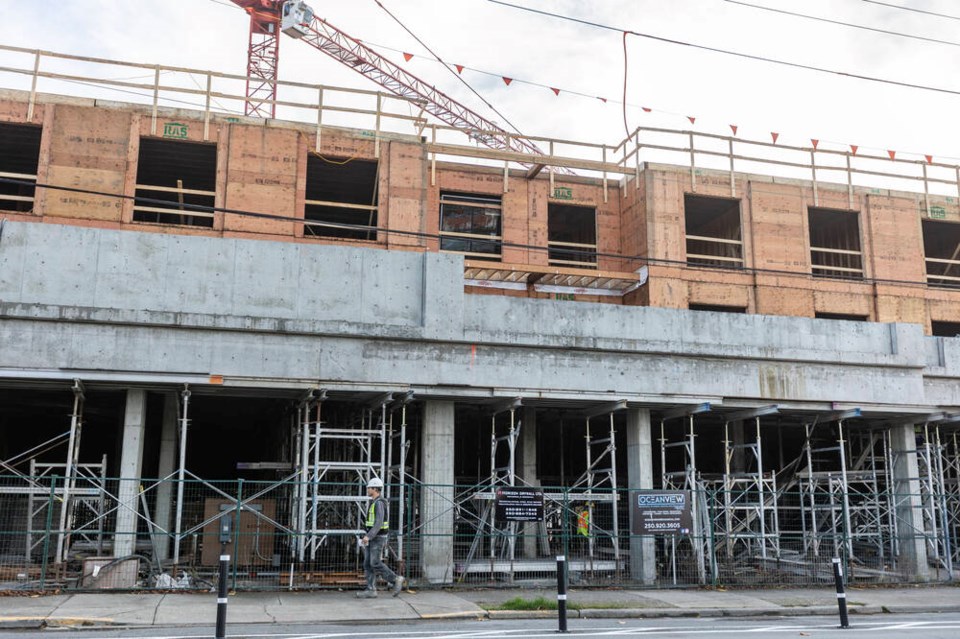The City of Victoria is well ahead of the pace needed to hit its provincially set five-year housing target of building just over 4,900 homes, although it’s falling short on affordable and family-size units.
A city report says 1,477 net new units were completed in the first year, exceeding the target of 659 new homes, which means Victoria is now 30 per cent of the way to meeting the five-year target.
Coun. Matt Dell pointed out that while many municipalities aren’t coming close to meeting the targets, Victoria is going above and beyond, with about 7,000 homes and “lots of big developments” in the pipeline. But he said the province needs to do its part and provide support for infrastructure such as recreation centres and bike lanes.
“As much as I’m happy to build the housing, I think there’s an expectation that building housing there comes along with it funding for amenities, funding for projects,” he said.
Mayor Marianne Alto noted that the province had indicated initially that there would be rewards for communities that met or exceeded targets, but “that seemed to sort of fade away as the conversation continued.”
Alto said once the new provincial cabinet is named, such rewards would be “a welcome change or perhaps addition to their policies around housing.”
When the targets were announced last year, the province suggested municipalities hitting their targets would be more likely to get funding for amenities, while communities that didn’t meet the targets, or failed to show enough progress, could face provincial intervention.
The province threatened to appoint an independent adviser to assist municipalities that are falling behind, or to overrule a municipality on land-use matters to add more density.
Saanich has already reported that it will fall short of housing targets this year, but says it has laid the groundwork to allow it to meet the mark in 2025.
The district’s provincially required housing-target progress report showed it handed over occupancy permits for 338 units between Oct. 1, 2023 and Sept. 30, 2024. The target was 440 in the first year and 4,610 net new units to be completed in five years.
Alto said Victoria is demonstrating for other municipalities what is possible.
“I would certainly hope that our colleagues, certainly around the region, but around the province as well, will be able to see that. It may be challenging, and it is, and certainly it requires an enormous amount of effort and intentionality, but we can make this happen if we want to.”
But Victoria has fallen short in some categories of housing.
The report noted the city continues to see fewer three-bedroom family-friendly and below-market housing units than recommended. According to the report, only 168 below-market rental units have been completed, while the province had set a target of 1,798 by the fall of 2028.
At the same time the city has only issued occupancy permits for 72 three-bedroom units, while the five-year target is 736.
Coun. Krista Loughton acknowledged they have work to do, stressing the need for affordable homes.
“There’s been a lot of talk about the family housing policy and how to get more three-plus-bedroom units into the market, which is important, but I personally think that the below-market [housing] is more important and we’re going to have to really do everything we can to support non-market housing providers to make sure that these housing types come online,” she said.
Coun. Stephen Hammond said developers have been able to get most projects passed by a council that’s singularly focused on the need for housing, which has done nothing to improve affordability.
“Most of our development approvals continue to keep our city in the category of unaffordable. We all know why we want to live here and why so many others will as well. But that doesn’t mean we just allow anything to be built in our city,” he said.
Hammond noted that many of the units the city has recently approved are micro units, “which is a nice way of saying tiny.”
“I can’t accept that we continue to build tiny and expensive homes, ignoring the needs of people looking for more affordability.”
Hammond has suggested requiring larger two- and three-bedroom units. He said that could mean developers are less likely to make a big profit on a project, and the price of the land could reflect that.
>>> To comment on this article, write a letter to the editor: [email protected]



